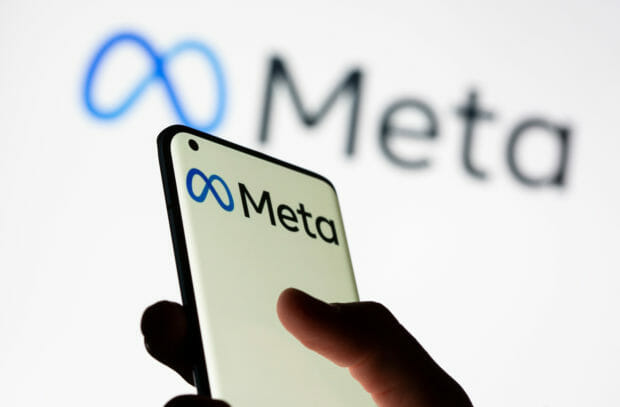
FILE PHOTO: Woman holds smartphone with Meta logo in front of a displayed Facebook’s new rebrand logo Meta in this illustration picture taken October 28, 2021. REUTERS/Dado Ruvic/Illustration
Meta Platforms said on Tuesday it disrupted the first known China-based influence operation focused on targeting users in the United States with political content ahead of the midterm elections in November.
The network maintained fake accounts across Meta’s social media platforms Facebook and Instagram, as well as competitor service Twitter, but was small and did not attract much of a following, Meta said in a report summarizing its findings.
Still, the report noted, the discovery was significant because it suggested a shift toward more direct interference in U.S. domestic politics compared with previous known Chinese propaganda efforts.
“The Chinese operations we’ve taken down before talked primarily about America to the world, primarily in South Asia, not to Americans about themselves,” Meta global threat intelligence lead Ben Nimmo told a press briefing.
“Essentially the message was ‘America bad, China good,'” he said of those operations, while the new operation pushed messages aimed at Americans on both sides of divisive issues like abortion and gun rights.
Another Meta executive at the briefing said the company did not have enough evidence to say who in China was behind the activity.
Asked about Meta’s findings at a news conference, U.S. Attorney General Merrick Garland said his office was “very concerned” about intelligence reports of election interference by foreign governments “starting back some time ago and continuing all the way into the present.”
A Twitter spokesperson said the company was aware of the information in Meta’s report and also took down the accounts.
According to Meta’s report, the Chinese fake accounts posed as liberal and conservative Americans in different states. They posted political memes and lurked in the comments of public figures’ posts since November 2021.
A sample screenshot showed one account commenting on a Facebook post by Republican Senator Marco Rubio, asking him to stop gun violence and using the hashtag #RubioChildrenKiller.
The same network also set up fake accounts that posed as people in the Czech Republic criticizing the Czech government over its approach to China, according to the report.
Meta also said it had intercepted the largest and most complex Russian-based operation since the war in Ukraine began, describing it as a sprawling network of more than 60 websites impersonating legitimate news organizations, along with about 4,000 social media accounts and petitions on sites like U.S.-based campaign group Avaaz.
That operation primarily targeted users in Germany, as well as France, Italy, Ukraine and the United Kingdom, and spent more than $100,000 on ads promoting pro-Russian messages.
On a few occasions, Russian embassies in Europe and Asia amplified the content.